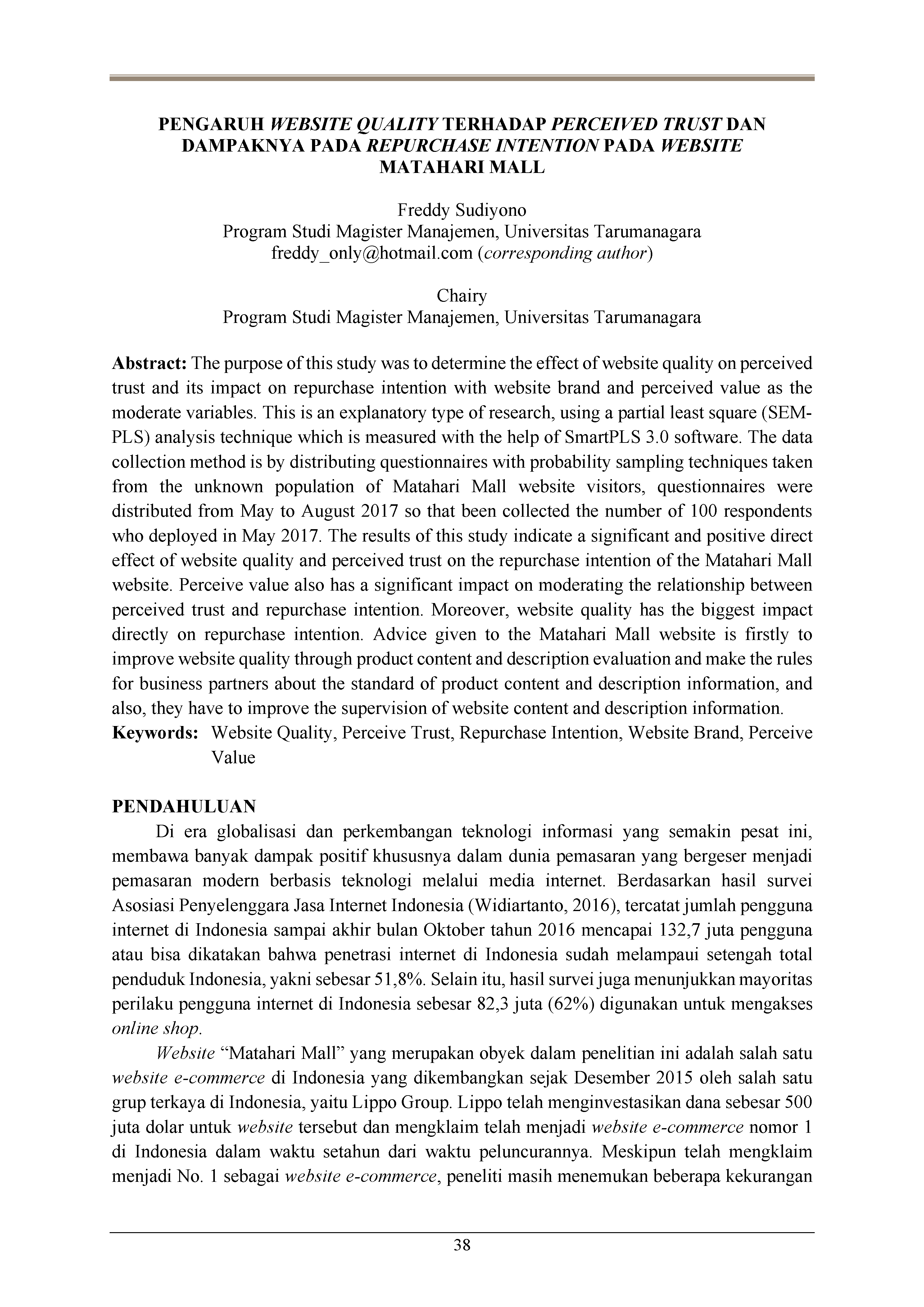Pengaruh website quality terhadap perceived trust dan dampaknya pada repurchase intention pada website Matahari Mall
Main Article Content
Abstract
The purpose of this study was to determine the effect of website quality on perceived trust and its impact on repurchase intention with website brand and perceived value as the moderate variables. This is an explanatory type of research, using a partial least square (SEM-PLS) analysis technique which is measured with the help of SmartPLS 3.0 software. The data collection method is by distributing questionnaires with probability sampling techniques taken from the unknown population of Matahari Mall website visitors, questionnaires were distributed from May to August 2017 so that been collected the number of 100 respondents who deployed in May 2017. The results of this study indicate a significant and positive direct effect of website quality and perceived trust on the repurchase intention of the Matahari Mall website. Perceive value also has a significant impact on moderating the relationship between perceived trust and repurchase intention. Moreover, website quality has the biggest impact directly on repurchase intention. Advice given to the Matahari Mall website is firstly to improve website quality through product content and description evaluation and make the rules for business partners about the standard of product content and description information, and also, they have to improve the supervision of website content and description information.
Article Details

This work is licensed under a Creative Commons Attribution-NonCommercial-ShareAlike 4.0 International License.
This work is licensed under a Jurnal Manajemen Bisnis dan Kewirausahaan Creative Commons Attribution-ShareAlike 4.0 International License.
References
Chang, H. H., & Chen, S. W. (2008). The impact of online store environment cues on purchase intention: Trust and perceived risk as a mediator. Online Information Review, 32(6), 818–841. https://doi.org/10.1108/14684520810923953
Chang, K.-C., Kuo, N.-T., Hsu, C.-L., & Cheng, Y.-S. (2014). The impact of website quality and perceived trust on customer purchase intention in the hotel sector: Website brand and perceived value as moderators. International Journal of Innovation, Management and Technology, 5(4), 255–260. https://doi.org/10.7763/ijimt.2014.v5.523
Chin, W. W. (1998). The partial least squares approach to structural equation modeling. In G. A. Marcoulides (Ed.), Modern Methods for Business Research (pp. 295–336). Lawrence Erlbaum Associates.
Ghozali, I., & Latan, H. (2015). Partial least squares: Konsep, teknik dan aplikasi menggunakan program SmartPLS 3.0 (2nd ed.). Badan Penerbit Universitas Diponegoro.
Kobayashi, T., & Okada, H. (2013). The effects of similarities to previous buyers on trust and intention to buy from E-commerce stores: An experimental study based on the SVS model. In IT Enabled Services (Vol. 9783709114, pp. 19–38). Springer Vienna. https://doi.org/10.1007/978-3-7091-1425-4_2
Sam, M. F. M., & Tahir, M. N. H. (2009). Website quality and consumer online purchase intention of air ticket. International Journal of Basic & Applied Sciences, 9(10), 4–9. https://citeseerx.ist.psu.edu/viewdoc/download;jsessionid=92BD8C36BA9538A9191312694C91DF6F?doi=10.1.1.656.2605&rep=rep1&type=pdf
Widiartanto, Y. H. (2016, October 24). 2016, pengguna internet di Indonesia capai 132 juta. Kompas.com. https://tekno.kompas.com/read/2016/10/24/15064727/2016.pengguna.internet.di.indonesia.capai.132.juta.


